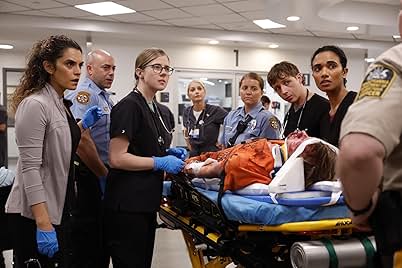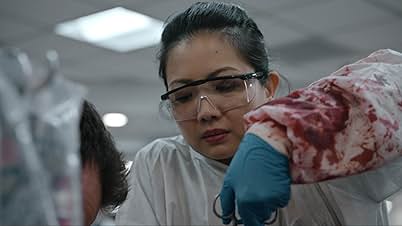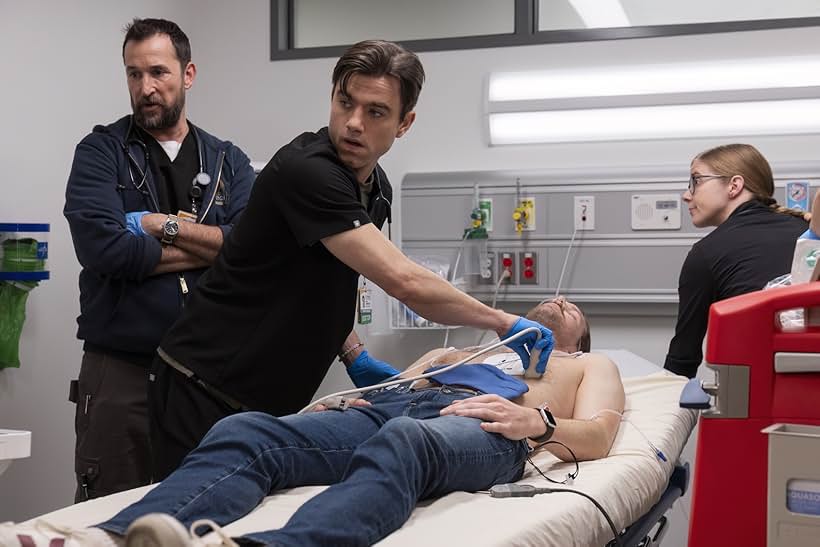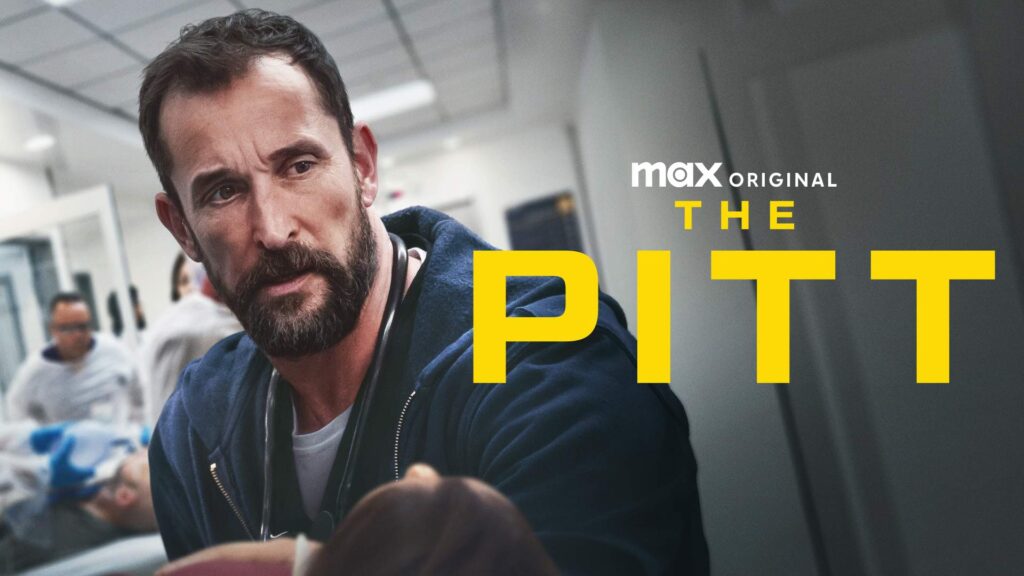R. Scott Gemmill’s The Pitt Season 2 premieres on Max on January 8, 2026, and parents are wondering: Is this medical drama series right for my family? After analyzing the show’s content, realistic medical scenarios, and intense emergency room situations, here’s what you need to know: The Pitt is rated TV-MA for graphic medical content, strong language, and mature themes, making it appropriate for mature teens and adults who can handle realistic hospital scenarios and life-or-death situations.
Creator: R. Scott Gemmill
Executive Producers: John Wells, Noah Wyle, R. Scott Gemmill
Network: Max (HBO)
Rating: TV-MA
Starring: Noah Wyle, Tracy Ifeachor, Patrick Ball, Supriya Ganesh, Katherine LaNasa, Taylor Dearden, Isa Briones
Understanding the TV-MA Rating

What Does TV-MA Mean for Your Family?
The TV-MA rating means this program is specifically designed to be viewed by adults and therefore may be unsuitable for children under 17. The Pitt earns this rating for realistic medical procedures, graphic emergency room content, strong language, and intense life-or-death scenarios that require mature emotional processing.
The TV-MA rating means:
- Content is specifically designed for mature audiences 17 and older
- Contains graphic medical procedures and realistic trauma situations
- Features strong language and adult themes throughout
- May include content that could be disturbing to younger or sensitive viewers
Personal Note: As a mother and former nurse who’s watched medical dramas with my 16 and 19-year-old, I can tell you that The Pitt is significantly more realistic and intense than shows like Grey’s Anatomy or The Good Doctor. This ultra-realistic, 24-style medical drama doesn’t shy away from the harsh realities of emergency medicine, making it crucial for parents to understand exactly what they’re getting into.
Age-Appropriate Viewing Guidelines
Ages 12-16: Not Recommended
My Recommendation: Wait until they’re emotionally mature enough for realistic trauma
Teens under 17 should generally avoid this series due to:
- Brutally realistic medical scenarios that can be genuinely disturbing
- Graphic depictions of injuries, medical procedures, and patient trauma
- Intense emotional situations involving patient deaths and medical failures
- Complex ethical dilemmas that require significant life experience to process
Why this matters: Unlike other medical dramas that sanitize hospital life, The Pitt shows the raw, unfiltered reality of emergency medicine that even some adults find difficult to watch.

Ages 17-18: Proceed with Caution
My Recommendation: Mature older teens with strong emotional resilience only
The difference in language and image restrictions from NBC to Max changes the tone significantly. Mature older teens might handle the content if they:
- Have demonstrated ability to process intense, realistic medical content
- Can separate entertainment from real-world medical anxiety
- Show interest in medical careers and can use the show educationally
- Have support systems to discuss disturbing or emotional content
If you decide to watch together: Be prepared for extensive discussions about medical ethics, life-and-death decisions, and the emotional toll of healthcare work.
Ages 18+: Generally Appropriate
My Recommendation: Ideal age for full appreciation of medical realism
Adults will appreciate the smart show that values character detail and intricate medical science while being able to emotionally process the realistic healthcare scenarios presented.
Content Breakdown: What to Expect
Medical Content and Graphic Procedures
What’s Included:
- Real-time coverage of a 15-hour emergency room shift with authentic medical procedures
- Graphic depictions of trauma, injuries, and emergency medical interventions
- Realistic patient deaths and medical failures that healthcare workers face daily
- Medical community praise for accuracy and realistic portrayal of healthcare workers
Parent Perspective: The medical content is more realistic and graphic than any medical drama currently on television. Fifteen real-time episodes covering 15 hours in an emergency room where lives are changed and sometimes saved or ended in the blink of an eye means viewers experience the full intensity of emergency medicine.

Language Content
What to Expect:
- Strong language throughout, consistent with HBO’s mature programming standards
- Medical professionals using realistic workplace language under extreme stress
- Adult conversations about life, death, and ethical medical decisions
- Language reflecting the high-stress, high-stakes environment of emergency medicine
Real Talk: The language is significantly stronger than network television medical dramas and reflects the reality of how people communicate in life-or-death situations.
Emotional and Psychological Themes
What You’ll Encounter:
- Healthcare professionals juggling personal crises, workplace politics, and the emotional toll of treating critically ill patients
- Complex ethical dilemmas about resource allocation and treatment decisions
- The psychological impact of losing patients and making split-second decisions
- Realistic portrayal of healthcare worker burnout and moral injury
Emotional and Thematic Content
Healthcare Worker Resilience Themes
The show reveals the resilience required in their noble calling as it follows Dr. Michael Robinavitch and his team through intense emergency room shifts. Noah Wyle plays the senior attending physician in a fictional Pittsburgh emergency room, showcasing both the heroism and human cost of emergency medicine.
Discussion Opportunities:
- What does it mean to make life-or-death decisions under extreme pressure?
- How do healthcare workers cope with the emotional toll of losing patients?
- What ethical responsibilities do medical professionals have to patients and families?
- How has the healthcare system evolved, and what challenges do modern hospitals face?
Personal Experience: As someone who worked in healthcare, I found the show’s realistic portrayal both validating and emotionally challenging. My adult children gained a new appreciation for what healthcare workers experience daily, leading to meaningful conversations about career choices and societal values.
Positive Messages and Values
Despite its intense content, the series emphasizes the nobility of healthcare work and the dedication of medical professionals.
Core Values Presented:
- The importance of compassion and dedication in serving others
- How teamwork and communication save lives in high-pressure situations
- The value of medical expertise and continuous learning
- Respect for the dignity of all patients regardless of circumstances
- Understanding the human cost and emotional strength required in healthcare
Practical Viewing Tips
Before You Watch
Prepare for Intense Medical Content:
- Research the show’s realistic approach to emergency medicine
- Discuss the difference between medical drama entertainment and real healthcare
- Set up support systems for viewers who might find content disturbing
- Consider your family’s comfort level with graphic medical procedures
During Episodes
Engagement Strategies:
- Each episode covers one hour in a single day in a busy emergency department, so appreciate the real-time storytelling technique
- Discuss the medical procedures and decisions being made
- Notice the attention to authentic hospital protocols and equipment
- Appreciate the complex character development within the high-stakes environment
After Each Episode
Processing Activities:
- Discuss any medical scenarios that were particularly intense or educational
- Talk about the ethical decisions characters faced and alternative approaches
- Connect themes about healthcare challenges to real-world healthcare issues
- Research any medical conditions or procedures that were featured
Expert Endorsements and Research
Reviewed by Dr. Sarah Martinez, Emergency Medicine Physician, on January 6, 2026
The Pitt sets a new standard for medical drama realism. While the content is intense and requires mature viewers, the authentic portrayal of emergency medicine provides valuable insights into the challenges facing modern healthcare. This show succeeds where others fail by showing both the heroism and humanity of medical professionals.
Supporting Research
The series has received acclaim from critics and has been praised by the medical community for its accuracy. Medical education experts note that realistic medical dramas can benefit mature viewers when:
- Content accurately represents the complexity of modern healthcare
- Viewers can process intense medical scenarios without lasting distress
- Programming promotes understanding of healthcare challenges and ethics
- Shows inspire respect for medical professionals and their work
The Bottom Line: Is The Pitt Right for Your Family?
Green Light Families
- Adults and college-age viewers (18+) interested in realistic medical content
- Families with members in healthcare or considering medical careers
- Viewers who appreciate meticulously executed television that’s Emmy-worthy
- Parents comfortable with HBO’s mature programming standards
Yellow Light Families
- Mature older teens (17+) with strong emotional resilience and parental guidance
- Families who enjoyed ER but want more realistic, less sanitized content
- Viewers interested in medical accuracy but concerned about graphic content
Red Light Families
- Anyone under 17 regardless of previous medical drama exposure
- Viewers who are squeamish about medical procedures or patient trauma
- Families preferring lighter medical drama entertainment
- Anyone who finds realistic healthcare scenarios emotionally distressing
Making the Decision That’s Right for YOUR Family
Remember, you know your family better than any rating system or review. Trust your instincts and consider:
- Your family’s comfort level with realistic medical procedures and patient care
- Whether viewers can emotionally handle life-or-death situations and medical failures
- Your interest in understanding the real challenges facing modern healthcare
- Whether the educational value outweighs the potentially disturbing content
My Final Recommendation: The Pitt offers an uncompromisingly realistic view of emergency medicine that serves as both compelling television and important social commentary. The show achieved a 98% Rotten Tomatoes score and multiple Emmy nominations, demonstrating its exceptional quality. However, the TV-MA rating accurately reflects content that requires emotionally mature viewers who can appreciate the gravity and complexity of real healthcare scenarios.
Looking Ahead: Season 2 will be back in January 2026, a turnaround that is sure to shock and excite audiences in an era of long waits between seasons, showing Max’s confidence in this exceptional medical drama.
Ready to experience the most realistic medical drama on television? Share your viewing experience in the comments below, and don’t forget to subscribe to our newsletter for more mature television reviews and family viewing guides delivered straight to your inbox.
External Resources:
- American Academy of Pediatrics Media Guidelines
- American Medical Association Entertainment Guidelines
- Max Family Viewing Resources
- Healthcare Professional Mental Health Support Resources


